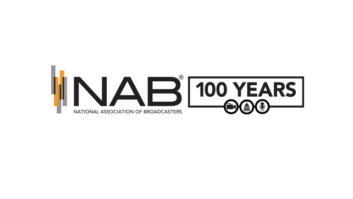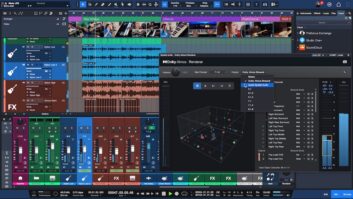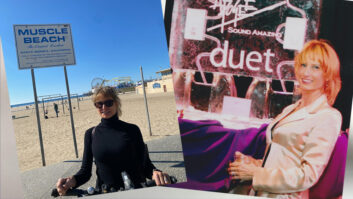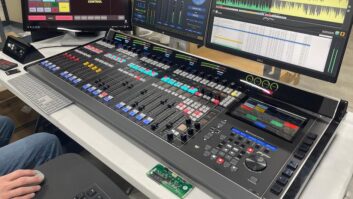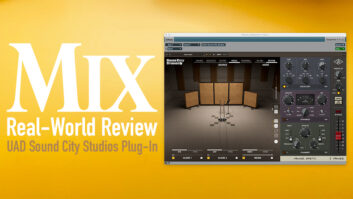HOLLYWOOD, CA—The ASCAP “I Create Music” Expo, celebrating its tenth anniversary in Los Angeles, put nearly 200 panelists and performers in front of hordes of music business hopefuls at the end of April. The annual three-day conference on the craft and business of songwriting, composing and producing also featured exhibits and workshops by a slew of pro audio companies, including Ableton, Ilio, iZotope, Native Instruments, PMC and Prism Sound, as well as retailers Sam Ash and Vintage King Audio.
Sharing knowledge at the ASCAP “I Create Music” Expo were (l-r): Maurice Patist, president of sales & marketing, PMC; speakers Michael James and Rob Chiarelli; and Vintage King sales representatives Jeffrey Ehrenberg and Chris Bolitho. The Expo offered plenty of opportunities for attendees to learn about the music business from established artists, songwriters, composers, producers and others. But the information imparted may not always have been what the audience wanted to hear. During one of monitor loudspeaker manufacturer PMC’s sessions, for example, producer and mixer Rob Chiarelli spoke from experience regarding the “unbelievably competitive” process of pitching music to a record label. “The reality of the business—and everyone will hate this—is that the louder record wins,” he said. “I’ve never heard a quieter record win in an A&R meeting.”

Earlier in the same session, producer and mixer Michael James offered his top production tip: Remove distractions—anything that does not support the song’s key elements, which could be the vocal, a guitar figure or both—and focus on the song’s emotional resonance, he advised. “Don’t get hung up in the details, at least at first,” said James, adding, “It’s a game of inches when you get to the mixing phase.”
A panel discussion, Women Behind the Music, celebrated the accomplishments of a number of artists, songwriters and label executives, but also addressed the subject of sexism. Faith Newman, who discovered and signed Nas in 1991, recalled how someone subsequently tried to take credit for the rapper’s success. “This particular person…was playing golf with the president of Sony; I don’t do that. I’m not going to go to a strip club with you. There’s this boys’ club, and you are not a part of it,” she said.
“I heard the word ‘difficult’ being thrown around,” agreed Santigold, who has long had full control of her own career with respect to everything from costumes and choreography to her music. “People aren’t used to a woman in this industry walking in and knowing what they want, and being willing to stand behind what they want.”
Owner and composer Jez Colin and composer Erich Lee from music production company Hi-Finesse, along with Heather Kreamer, director of music for marketing company Create Advertising, offered insights into the specialized world of music for movie trailers. “It’s a struggle to get songs placed,” Colin warned songwriters in the crowd.
Traditionally, a two-minute trailer uses separate pieces of music for the beginning, middle and end. These days, said Colin, “There’s a growing trend to find a single piece that gets massive and epic at the end.”
Happily, Lee has become adept at composing for trailers, often using hybrid instrumentation such as virtual synths and sample libraries married with real performances. “You need quality instruments at your fingertips,” said Lee. Time is always of the essence, he added: “We have to turn things around in 24, 48 hours.”
Panelists for The Music Supervisor’s Mission explained the process and the particulars of their respective jobs, which included everything from big-budget to indie films as well as television. Moderator Christine Belden of the Nettwerk Music Group asked how they cope with tiny budgets. “Lots of begging,” laughed Anton Monsted, who has worked on many of Australian director Baz Luhrmann’s films.
All agreed that it behooves the music supervisor to be involved as early as possible in a film’s production, whenever possible. But television is another matter. Kasey Truman, who works on shows such as Scandal and Mad Men, reported that she typically has about two weeks lead-time on each episode.
Colleen Fitzpatrick of Nickelodeon commented, “Our turnaround is so fast.” For the network’s shows, she said, there is a run-through on Friday afternoon, rehearsal on Saturday, and the program shoots on Monday.
Rock Songwriters on the Move, moderated by mixer and producer Chris Lord-Alge, delved into the relatively recent trend for songwriters to branch out beyond their own bands and write for and with other artists. How do you know when a song you have worked on is being released on an album, asked Lord-Alge. “Up until that day [of release], you don’t know,” said John Feldmann of the band Goldfinger.
Sum 41’s Deryk Whibley noted that he is indebted to Feldmann: “You taught me Pro Tools backstage” on the 2001 tour that their bands did together. Whibley also revealed he is unable to write on the road. Feldmann, in contrast, wrote Goldfinger’s entire Hang-Ups album on the bus, with some of the 4-track recordings making it onto the final release.
American Society of Composers, Authors and Publishers
ascap.org
